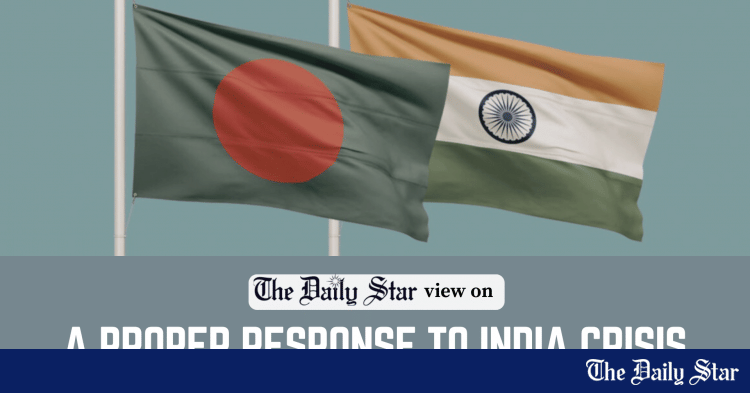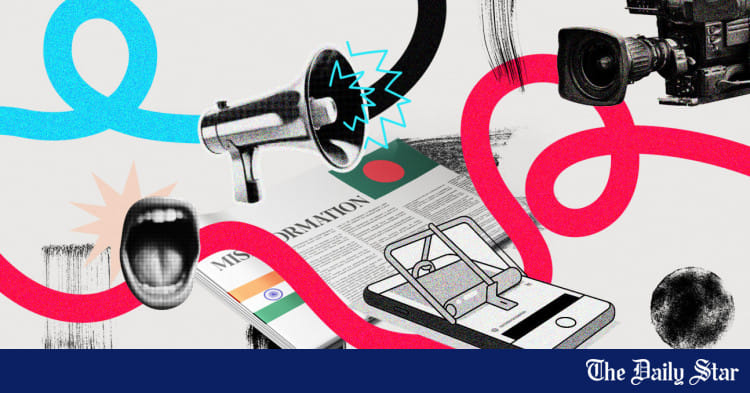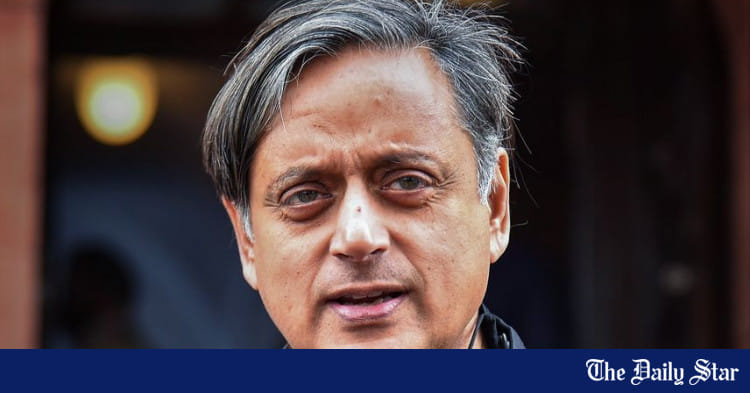Why India should address the misinformation campaign against Bangladesh

The relationship between Bangladesh and India is undeniably getting strained. Recent events reflect that tensions are continuing to rise. On December 2, over 50 protesters reportedly entered the premises of the Bangladesh mission in Tripura's Agartala and vandalised it, violating the Vienna Convention. The Indian Ministry of External Affairs (MEA) said the action was "regrettable," and ramped up security at all of Bangladesh's diplomatic missions around the country; however, uncertainty remains regarding what lies ahead. On December 3, the All Tripura Hotels and Restaurant Owners Association announced a temporary ban on serving Bangladeshi tourists, citing the mistreatment of minorities in Bangladesh. Earlier, ILS Hospital, a multi-specialty private hospital, announced that it would not treat any patients from Bangladesh, protesting against "atrocities on minorities" in the neighbouring country. The events point to an escalation of anti-Bangladesh sentiments on the Indian side, fostered by a misinformation campaign in sections of the Indian media and government.
For context, tensions have further simmered since the arrest of former ISKCON leader Chinmoy Krishna Das Brahmachari at Dhaka airport on sedition charges, and the subsequent killing of Saiful Islam Alif, a lawyer and assistant public prosecutor who was fatally attacked with sharp objects during protests after Das was denied bail in Chattogram. Arnab Goswami's Republic TV falsely reported the incident claiming, "Muslim lawyer representing ISKCON Chinmoy Das killed," which went viral, spreading through legions of trolls and social media users, using the post to further demonise Bangladesh. Fact-checking by the chief adviser's press wing revealed that the lawyer representing Das was Subasish Sharma. Among those arrested for Alif's murder, two men, Zia Uddin Fahim and Rajiv Bhattacharya alias Suman, were affiliated with Chhatra League, Awami League's student wing. Sheikh Hasina also used the attack on the lawyer to state that the Yunus regime "fails to punish these terrorists." The Indian media are, in many ways, aligned with Sheikh Hasina and the Awami League's false rhetoric.
'Mamata Banerjee calls for UN peacekeepers in Bangladesh amid anti-Hindu violence." The industrial scale of exaggeration regarding Bangladesh has followed a premise that can be summed up with a line plucked out of the aforementioned article: "Since Sheikh Hasina's resignation as Bangladesh's Prime Minister following violent protests, the country has witnessed increasing violence against Hindus." The wording encompasses the narrative that the Awami League—which was elected through a farce of an election—uses to delegitimise the democratic movement that saw the end of its fascist governance. The truth is conveniently warped: Sheikh Hasina unleashed deadly violence on peaceful protesters (which included shooting them on sight), killing hundreds of students.
The December 2 incident in Agartala followed days after a protest by Bongio Hindu Jagran group. Seeking the immediate release of Chinmoy Krishna Das, protesters gathered to express grievances to the deputy Bangladesh high commissioner in Kolkata. Few representatives were allowed to enter the Deputy High Commission. According to The Hindu, Acharya Sanjay Shastri, after submitting a request to the assistant deputy high commissioner, said, "They have listened to our grievances. They have assured us that they will carry our voices to the Bangladesh government." Large sections of the Indian media left out this segment of the events that transpired when reporting on the clash and the burning of the Bangladesh flag in Kolkata.
Misinformation (the inadvertent sharing of false or misleading information) and disinformation (the deliberate dissemination of falsehoods to deceive) have been a pervasive problem, especially as India continues to voice its concerns regarding Bangladesh ever since the ouster of the Awami League government. The exaggeration of attacks on Hindu minorities to provoke the public, drawing parallels with Gaza and Ukraine from sections of the Indian government, serve to further strain the relationship between the two nations. With social media playing a huge role in global politics, the most terrifying aspect of disinformation is that it is shared and consumed in a decentralised manner, where asking social media platforms to fix the crisis has not helped any nation. The anti-Bangladesh sentiment has already spread to the US President-elect Donald Trump, who used it before the election to gain votes. It is also being embraced by members of parliament in the United Kingdom. On December 2, Labour MP Barry Gardiner embraced the AL narrative referring to the shooting of unarmed citizens as "riots," and misrepresented Bangladesh as an "Islamic state," aligning with the Islamophobic rhetoric put forth by the Indian media that Bangladesh is the "next Afghanistan."
According to the 2024 World Economic Forum's Global Risks Report, India is the leading country in terms of misinformation and disinformation prevalence. Per the Global Investigative Journalism Network (GIJN), research into disinformation and misinformation says that the more individuals are exposed to falsehoods, the greater the likelihood they are to believe them, even when the information contradicts their existing beliefs. This alarming trend in the spread of misinformation has led to increased political, religious and social polarisation and unrest in India. Fourteen Indian nationals—identifying as "left-wing" or "secular"—interviewed by The Daily Star expressed concern regarding the presence of Sheikh Hasina in India, the incendiary language used by Indian television hosts, and what that means for India's own democracy under what they called "a far-right government, which embraces communal politics" and "division across religious lines."
The misinformation machine in India has the potential to wreak havoc in Bangladesh with Indian media channels operating at a global scale. In 2019, the EU DisinfoLab identified a network of at least 265 coordinated fake local media outlets operating in over 65 countries, which have links with India. By 2020, the network had grown to include 750 fake news websites spanning 116 countries. A section of the Indian media, such as The Quint, has itself addressed the issue of misinformation. Articles were published fact-checking the wildfire spread of fake news regarding the violence against minorities which took away attention from the violence that did actually take place, leaving minorities in a more vulnerable position.
India is applying its own framework of sectarian politics to interpret and represent Bangladesh, a nation that has historically had a legacy of cultural diversity and coexistence. The antagonistic perspective disregards the nuanced reality of Bangladesh, even amid the widespread religious tensions that characterise much of South Asia. In her seminal work The Clash Within: Democracy, Religious Violence, and India's Future, scholar Martha Nussbaum delves into the complexities of religious extremism and its threat to India's secular democracy leading to demonisation of minorities. Using the same template to understand the party politics in Bangladesh is unproductive and goes beyond misinformation, as Indian establishments fall short of seeing the nuanced politics and forces at play in Bangladesh, regardless of the source that is used to produce news.
Eminent Indian journalist Salil Tripathi critiques India's diplomatic strategy for its heavy reliance on individual leaders, investment into the former leader of Bangladesh, and for overlooking broader spectrum of Bangladeshi society. India's approach, along with misplaced concerns and deeply entrenched culture of misinformation in India poses challenges for bilateral relations. The dynamics of bilateral relations warrant deeper examination, particularly the resistance to calls for an equal partnership and a meaningful voice in foreign policy decisions. As the most powerful nation in the region and an aspiring superpower, India wields significant influence over regional resources, but this dominance should not come at a disproportionate cost to its neighbouring countries.
The unequal dynamics between Bangladesh and India are starkly evident in several areas: the water-sharing agreements, where Bangladesh endures water shortages while India benefits from unregulated upstream usage; the persistent trade imbalance favouring India; the harsh treatment of Bangladeshis along the border; and energy projects such as the Adani power plant that serve India's strategic interests. India has at times shown interest in Bangladesh's internal affairs, whereas Bangladesh has maintained a policy of non-interference in India's domestic issues.
The Indian state is fearful of the change in Bangladesh because it is conflating Bangladeshi people's voice against one leader that it favoured as a verdict against India, which is not the case. What is unfolding instead is a reflection of India's prejudice against its neighbour, evident in the ongoing misinformation campaigns that the state permits to persist, which in fact perpetuates a long-standing legacy of inequity towards minorities in India—who are conflated as unwanted Bangladeshi migrants. These incidents of discrimination are explored by political scientist Navine Murshed examining "India's Bangladesh problem." The 2019 Citizenship Amendment Act (CAA) passed in India with its discriminatory content portrays Bangladesh as a source of illegal migration and place of religious persecution. The current misinformation and disinformation campaign is a continuation of the same sentiment.
It must also be mentioned that India was among the leading countries in generating Covid-related misinformation. In one instance, a video falsely claimed that Bangladeshi citizens were sneaking into India en masse to receive vaccines—a narrative that exacerbated xenophobia and strained relations between the two countries. These doctored or contextually manipulated clips were shared widely, stoking communal tensions. Indian social media platforms are also awash with manipulated visuals of the Israel-Palestine conflict. These fabrications often originate from fringe groups but gain traction through retweets and shares by mainstream political figures, lending them undue credibility.
Doctored videos have become a staple of misinformation campaigns in India, often with far-reaching consequences. In one notorious example, a video was circulated purporting to show Bangladeshi citizens burning the Indian flag during a protest. The video was later debunked by Soch and AFP Fact Check, revealing it to be from an unrelated event in Jammu and Kashmir in 2009. However, the damage was done, as such content feeds into pre-existing biases and sows distrust between the two nations.
The role of Indian politicians in amplifying misinformation also cannot be ignored. From top leaders to regional politicians, many have shared unverified or misleading content and added their sensational analysis of the situation. For instance, inflammatory posts accusing Bangladesh of harbouring anti-India sentiments or allowing the persecution of Hindus have occasionally been shared by Indian political figures. Though pragmatic in his approach as a politician, External Affairs Minister S Jaishankar has, till this day, deliberately ignored the bloodshed that the previous regime caused in Bangladesh, and amplified the focus on violence against minorities since Bangladesh's former prime minister fled to India.
In recent parliamentary sessions, many prominent MPs have expressed concerns about safety of minorities and urged for diplomacy to ensure Indian interests are protected, but urging diplomatic initiatives without addressing the rampant misinformation undermines the effectiveness of such efforts. Repeatedly, mainstream Indian rhetoric fails to grasp the nuanced political dynamics that shape Bangladesh's unique political landscape. One glaring example involved claims that Bangladesh's interim government was complicit in attacks on Hindu minorities, using unverified reports and outdated visuals. While Bangladesh does face challenges regarding minority rights, the oversimplification and sensationalisation of such incidents fuel mistrust and hostility, making diplomatic engagement more challenging. The sensational narratives pushed in India not only undermine Bangladesh's sovereignty but, as shown by recent events, risk igniting communal tensions within both countries.
The misinformation campaigns emanating from India can have profound implications for Bangladesh-India relations in the long term. Misinformation exacerbates the existing tense dynamic, creating unnecessary friction over border issues, trade disputes, and communal incidents. A notable example is the controversy over the Citizenship Amendment Act (CAA) and the National Register of Citizens (NRC) in India gained prominence between 2019 and 2020. Misleading narratives portrayed Bangladesh as a country willingly expelling its Hindu population, ignoring the complex socioeconomic factors at play. The misinformation campaign led to protests and backlash in Bangladesh, straining bilateral ties.
But what must be realised by India—at this crucial inflection point where the choice is upon them to either manage the brewing tensions or nurture the division further—is that Bangladesh's stability is crucial for India's security and economic interests. As a gateway to Southeast Asia and a critical partner in India's "Act East" policy, a stable Bangladesh ensures regional connectivity and economic growth. The success of the current interim government is in India's best interest. India's cooperation with the interim government can lead to a better understanding for security of both nations in the long term. Demonisation of the interim government and the chief adviser will only harvest anti-Indian sentiment in Bangladesh, as it happened in Maldives, for example.
Misinformation in India also has wider repercussions for the Asia-Pacific region. As two of the largest South Asian nations, Bangladesh and India are key players in regional stability. A strained relationship between the two could disrupt initiatives like the Bay of Bengal Initiative for Multi-Sectoral Technical and Economic Cooperation (BIMSTEC) and hinder broader geopolitical objectives. Furthermore, misinformation campaigns that portray Bangladesh as antagonistic to India serve only to weaken regional solidarity. A secure Bangladesh is necessary to keep the separatist movement in India's northeastern states at bay as the two countries share a porous border over 4,000 kilometres, much of which runs along India's sensitive northeastern region. The matter is particularly concerning in a time when the Asia-Pacific region faces challenges like climate change, economic inequality, and great power rivalries. For India to achieve its aspirations of being a regional leader, fostering trust and cooperation with neighbours like Bangladesh is essential.
In an era where perception often supersedes reality, combating misinformation is as critical as addressing traditional security threats. For India, maintaining a stable, cooperative relationship with Bangladesh should not only be a matter of diplomacy but a strategic imperative. To achieve this, both nations must work together to tackle the scourge of misinformation that threatens to undermine the shared aspirations of their people. Both nations share a historical and cultural legacy and interconnected economies. Continuation of false and antagonistic narratives about communal violence, migration, and political instability risks eroding the foundation of the historic trust between the two countries when that does not need to be the case.
Ramisa Rob is in-charge of Geopolitical Insights at The Daily Star.
Sarzah Yeasmin is a contributor to Geopolitical Insights at The Daily Star and an alum of Harvard University.















